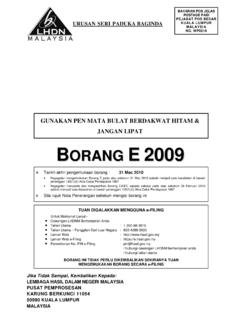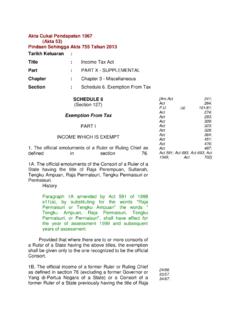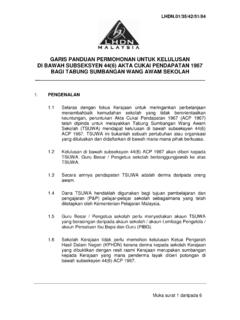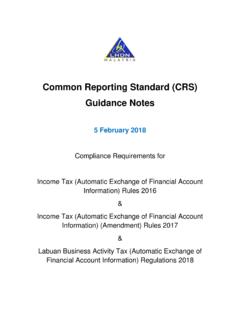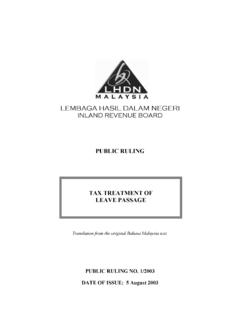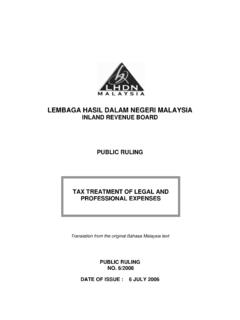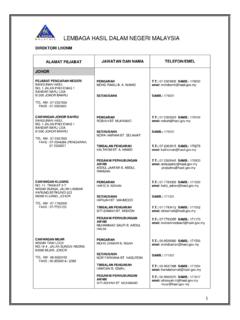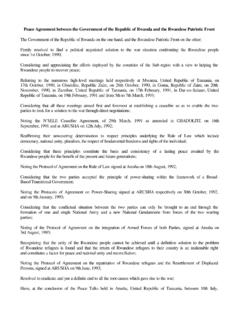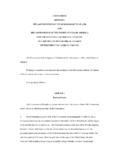Transcription of AGREEMENT BETWEEN THE KINGDOM OF SPAIN …
1 (A): 258/2007. Signed: 24 May 2006. Effective Date: 1 January 2008. AGREEMENT BETWEEN THE KINGDOM OF SPAIN AND MALAYSIA. FOR THE avoidance OF double taxation AND THE PREVENTION OF. FISCAL EVASION WITH RESPECT TO TAXES ON INCOME. The Government of the KINGDOM of SPAIN and the Government of Malaysia desiring to conclude an AGREEMENT for the avoidance of double taxation and the Prevention of Fiscal Evasion with respect to Taxes on Income have agreed as follows: Article 1. PERSONS COVERED. This AGREEMENT shall apply to persons who are residents of one or both of the Contracting States. Article 2. TAXES COVERED. 1. This AGREEMENT shall apply to taxes on income imposed on behalf of a Contracting State or of its political subdivisions or local authorities, irrespective of the manner in which they are levied.
2 2. There shall be regarded as taxes on income all taxes imposed on total income, or on elements of income. 3. The existing taxes which are the subject of this AGREEMENT are: (a) in Malaysia: (i) the income tax; and (ii) the petroleum income tax;. (hereinafter referred to as "Malaysian tax");. (b) in SPAIN : (i) the income tax on individuals;. (ii) the corporation tax; and (iii) the income tax on non residents;. (hereinafter referred to as "Spanish tax"). 4. This AGREEMENT shall apply also to any identical or substantially similar taxes which are imposed after the date of signature of this AGREEMENT in addition to, or in place of, the existing taxes. The competent authorities of the Contracting States shall notify each other of any significant changes which have been made in their taxation laws.
3 Article 3. GENERAL DEFINITIONS. 1. For the purposes of this AGREEMENT , unless the context otherwise requires: (a) the term "Malaysia" means the territories of the Federation of Malaysia, the territorial waters of Malaysia and the sea-bed and subsoil of the territorial waters, and includes any area extending beyond the limits of the territorial waters of Malaysia, and the sea- bed and subsoil of any such area, which has been or may hereafter be designated under the laws of Malaysia and in accordance with international law as an area over which Malaysia has sovereign rights for the purposes of exploring and exploiting the natural resources, whether living or non-living;. (b) the term " SPAIN " means the KINGDOM of SPAIN , and when used in a geographical sense, means the territory of the KINGDOM of SPAIN , including its territorial sea and any area outside its territorial sea upon which, in accordance with international law and on application of its domestic legislation, the KINGDOM of SPAIN exercises or may exercise in the future jurisdiction or sovereign right with respect to the seabed, its subsoil and superjacent waters, and their natural resources.
4 (c) the terms "a Contracting State" and "the other Contracting State". mean SPAIN or Malaysia as the context requires;. (d) the term "person" includes an individual, a company and any other body of persons;. (e) the term "company" means any body corporate or any entity which is treated as a body corporate for tax purposes;. (f) the terms "enterprise of a Contracting State" and "enterprise of the other Contracting State" mean respectively an enterprise carried on by a resident of a Contracting State and an enterprise carried on by a resident of the other Contracting State;. (g) the term "national" means: (i) any individual possessing the nationality or citizenship of a Contracting State;. (ii) any legal person, partnership or association deriving its status as such from the laws in force in a Contracting State.
5 (h) the term "international traffic" means any transport by a ship or aircraft operated by an enterprise of a Contracting State, except when the ship or aircraft is operated solely BETWEEN places in the other Contracting State;. (i) the term "competent authority" means: (i) in the case of Malaysia, the Minister of Finance or his authorised representative; and (ii) in the case of SPAIN , the Minister of Finance or his authorised representative. 2. As regards the application of this AGREEMENT at any time by a Contracting State, any term not defined therein shall, unless the context otherwise requires, have the meaning that it has at that time under the law of that State for the purposes of the taxes to which this AGREEMENT applies, any meaning under the applicable tax laws of that State prevailing over a meaning given to the term under other laws of that State.
6 Article 4. RESIDENT. 1. For the purposes of this AGREEMENT , the term "resident of a Contracting State" means any person who, under the laws of that State, is liable to tax therein by reason of his domicile, residence, place of management or any other criterion of a similar nature, and also includes that State, any political subdivision, local authority or a statutory body thereof. 2. Where by reason of the provisions of paragraph 1 an individual is a resident of both Contracting States, then his status shall be determined as follows: (a) he shall be deemed to be a resident only of the State in which he has a permanent home available to him; if he has a permanent home available to him in both States, he shall be deemed to be a resident only of the State with which his personal and economic relations are closer (centre of vital interests).
7 (b) if the State in which he has his centre of vital interests cannot be determined, or if he has not a permanent home available to him in either State, he shall be deemed to be a resident only of the State in which he has an habitual abode;. (c) if he has an habitual abode in both States or in neither of them, he shall be deemed to be a resident only of the State of which he is a national;. (d) if he is a national of both States or of neither of them, the competent authorities of the Contracting States shall settle the question by mutual AGREEMENT . 3. Where by reason of the provisions of paragraph 1 a person other than an individual is a resident of both Contracting States, then the competent authorities of the Contracting States shall settle the question by mutual AGREEMENT taking into account where the place of effective management is situated.
8 Article 5. PERMANENT ESTABLISHMENT. 1. For the purposes of this AGREEMENT , the term "permanent establishment". means a fixed place of business through which the business of an enterprise is wholly or partly carried on. 2. The term "permanent establishment" includes especially: (a) a place of management;. (b) a branch;. (c) an office;. (d) a factory;. (e) a workshop; and (f) a mine, an oil or gas well, a quarry or any other place of extraction of natural resources. 3. A building site, a construction, installation or assembly project constitutes a permanent establishment only if it lasts more than twelve months. 4. An enterprise of a Contracting State shall be deemed to have a permanent establishment in the other Contracting State if it carries on supervisory activities in that other State for more than six months in connection with a building site or a construction, installation or assembly project which is being undertaken in that other State.
9 5. Notwithstanding the preceding provisions of this Article, the term "permanent establishment" shall be deemed not to include: (a) the use of facilities solely for the purpose of storage, display or delivery of goods or merchandise belonging to the enterprise;. (b) the maintenance of a stock of goods or merchandise belonging to the enterprise solely for the purpose of storage, display or delivery;. (c) the maintenance of a stock of goods or merchandise belonging to the enterprise solely for the purpose of processing by another enterprise;. (d) the maintenance of a fixed place of business solely for the purpose of purchasing goods or merchandise, or of collecting information, for the enterprise;. (e) the maintenance of a fixed place of business solely for the purpose of carrying on, for the enterprise, any other activity of a preparatory or auxiliary character.
10 (f) the maintenance of a fixed place of business solely for any combination of activities mentioned in sub-paragraphs (a) to (e), provided that the overall activity of the fixed place of business resulting from this combination is of a preparatory or auxiliary character. 6. Notwithstanding the provisions of paragraphs 1 and 2, where a person - other than an agent of an independent status to whom paragraph 7 applies - is acting in one of the States on behalf of an enterprise of the other State, that enterprise shall be deemed to have a permanent establishment in the first- mentioned State in respect of any activities which that person undertakes for the enterprise if the person: (a) has, and habitually exercises in the first-mentioned State an authority to conclude contracts in the name of the enterprise, unless the activities of such person are limited to those mentioned in paragraph 5 which, if exercised through a fixed place of business, would not make this fixed place of business a permanent establishment under the provisions of that paragraph; or (b) has no such authority, but habitually maintains in the first- mentioned State a stock of goods or merchandise belonging to the enterprise from which he regularly fills orders on behalf of the enterprise.
